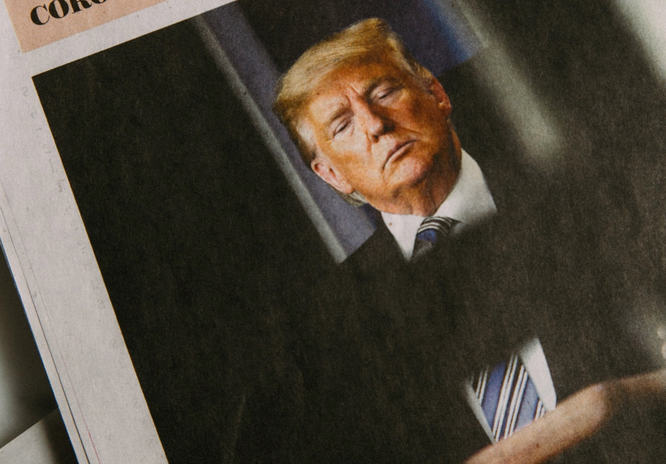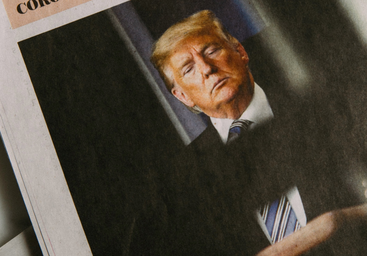After nearly four decades of legal scrutiny, former President Donald Trump is yet again facing the looming possibility of criminal charges. Spearheaded by Manhattan District Attorney Alvin Bragg, this grand jury case revolves around allegations of Trump falsifying business records linked to hush-money payments to women accusing him of sexual encounters, such as porn star Stormy Daniels and model Karen McDougal.
Prior to the end of the 2016 presidential campaign, Daniels attempted to sell her story of an affair with Trump to a tabloid, The National Enquirer. The publisher, David Pecker, had an agreement with Trump to prevent any negative stories during the campaign. Instead, Pecker and editor Dylan Howard, facilitated a deal between Daniels’ lawyer and Trump’s lawyer— Michael Cohen. This deal resulted in a payment of $130,000 from Cohen to Daniels, which Trump later reimbursed him from the White House.
Additionally, Trump would reimburse Cohen on a monthly basis, and prosecutors allege that he falsely accounted for these payments under the guise of legal expenses necessitated by a retainer agreement. Cohen was Trump’s personal attorney during his presidency, but the reimbursement was not related to any legal services nor did the retainer agreement exist in company records.
In 2018, Cohen was found guilty on numerous charges, some of which include federal campaign finance crimes regarding the payments. Cohen then directed the blame to Trump, who reportedly instructed him to pay off Daniels.
Falsifying business records is a misdemeanor in New York. In order to make this crime a felony, prosecutors must prove Trump had an “intent to defraud” that included an intent to commit or conceal a second crime. The prosecutors will argue that the second crime could be a violation of election law, if the $130,000 payout is an improper donation to the Trump campaign, as it technically benefited his candidacy through silencing Daniels.
This is completely new territory in the legal field, as New York prosecutors have never previously attempted to combine a falsifying business records charge with a violation of state election law. Ultimately, even if the DA’s efforts are successful, Trump would be convicted of a low-level felony that carries a maximum sentence of four years in prison, though prison time is not required. Additionally, Trump would still be able to continue his presidential campaign, even from behind bars.
Trump has denied all wrongdoing, a stance which was further emphasized at a campaign rally in Waco, Texas on Mar. 25. As the rally started, Trump stood with a hand over his heart while a song was performed by a choir of imprisoned insurrectionists. His speech focused on claiming innocence and discrediting the investigation as a political attack on him and his followers.
As Trump ramps up for his 2024 presidential run, he has claimed that this investigation is just a political “witch hunt” intended to damage his campaign. Several GOP politicians seem to agree, with House Speaker Kevin McCarthy calling the DA’s move “an outrageous abuse of power,” and Sen. Ted Cruz saying “It [the case] is frivolous, it is baseless, it is a political persecution.” Through his social media platform Truth Social, Trump has urged his supporters to “protest” and “take our nation back.” He has also warned of “death & destruction” if he is indicted, which has been followed by “several hundred threats” to Bragg’s office, according to law enforcement. In my opinion, these messages are eerily similar to the rhetoric leading up to the Jan. 6 insurrection, where Trump encouraged his followers to protest the election results.
While the hush-money investigation is the current focus of media attention, Trump is facing several additional possible charges. In Georgia, Trump is being investigated for attempts to illegally interfere in the 2020 election, such as a phone call he made asking Georgia Secretary of State Brad Raffensberger to “find 11,780 votes,” which is the number he needed to beat current President Joe Biden. Other inquiries focus on the classified government documents that were found in his residence after leaving office, and his efforts to stay in power despite losing the 2020 election.
When it comes to former Presidents, Trump’s legal troubles are certainly unique, especially if he receives criminal charges. The almost unprecedented conviction would technically make him the second President to be arrested, with the first being former President Ulysses Grant, who was arrested in 1872 for repeatedly speeding in his horse-drawn carriage. But the supposed beauty of America’s criminal justice system lies in the rule of law— No one is above the law, not even a former President of the United States.


